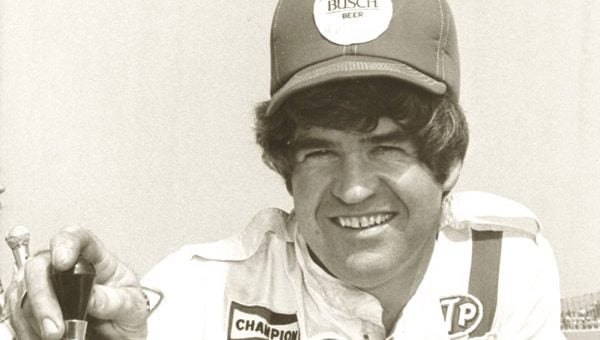When the young reporter asked John Delphus McDuffie why he had five cigars in his driver’s uniform pocket, he said in his distinct eastern North Carolina accent, “I chew on one every 100 miles. If I make it to the fifth cigar, I’ve had a pretty good day.”
McDuffie’s budget was always far less than those of the top teams of that era and regularly required used parts and volunteer pit crews to survive in NASCAR’s premier series. Glory was defined by outrunning other independent drivers, those defined as not having financial backing from Detroit’s big three auto manufacturers.
On Aug. 11, 1991, at Watkins Glen Int’l, the Sanford, N.C., native was still smiling from a wonderful evening the night before. He had participated in a one-hour autograph session with Dale Earnhardt, then headed out with his crew to compete in a celebrity race at Shangri-La Speedway in nearby Owego, N.Y., an event he won going away. He bought his crew breakfast a few hours before Sunday’s race.
Four laps into the Budweiser at the Glen NASCAR Cup Series race, McDuffie was headed toward turn five when his familiar No. 70 machine veered off course and began sliding through the grass, collecting the No. 52 car driven by Jimmy Means.
McDuffie’s car hit the guardrail and flipped onto its roof, coming to rest alongside Means’ car.
“Actually, he was behind me when we went into that corner. He was racing me so hard,” Means recalled. “I remember commenting to myself, ‘Dang, J.D., you’re all over me.’ I remember thinking, ‘J.D. is tough today.’ I turned off into the corner and something broke on his car right behind me. When he got to the corner, I was turning and he couldn’t turn.
“He hit my nose and turned me into the fence and hit me. His car got into the air and turned sideways and there was nothing he could do. If we had the seats we have today, he would have walked away.”
Means exited his car and looked into McDuffie’s Pontiac from the right side and quickly motioned for help. It is believed McDuffie lost his life instantly in the crash after suffering severe head trauma.
After a red flag period of 1 hour and 50 minutes, the race resumed with Ernie Irvan winning.
“After all I’ve been through, this is a great victory, but winning is tempered by J.D.’s death,” Irvan said. “I dedicate this victory to him. Every time we went through the turn where he crashed, I thought about him. I’ve known what it is like to struggle in this sport without a sponsor just like he did, and I’ll always remember him.”
Four days later, the 52-year-old McDuffie was laid to rest. More than 700 mourners filled Grace Chapel Christian Church and more than 3,000 had come to pay their respects two nights earlier at a funeral home not far from the home he and his wife, Ima Jean, shared.
After finding success in late model sportsman competition, McDuffie made his NASCAR Cup Series debut at Myrtle Beach (S.C.) Speedway on July 7, 1963. He finished 12th against the likes of Ned Jarrett, Buck Baker, Richard Petty and Bobby Isaac and felt he had found a new home.
McDuffie ran a dozen Cup Series events that season but returned to late model sportsman in 1964 and ’65.
McDuffie switched back to the top level of NASCAR in 1966. He did it with very little equipment and for years with a well-worn transporter named “Ole’ Blue” that became a staple of his fledgling race team.
McDuffie’s No. 70 race car would roll into the garage area strapped to the back of “Ole Blue.” After a few minutes of pulling ramps and loosening tie-downs, his ride was eased down and rolled into its assigned garage stall. Amid his ever-present cigar, McDuffie would start working on his car virtually unnoticed, going about the business of getting ready to practice and qualify.
“J.D. was a hard worker and made do the best he could with the stuff that he had,” said NASCAR Hall of Famer Bobby Allison. “He ran pretty good at some places but other places he had to be conservative. J.D. was a pretty quiet guy who just didn’t say a whole lot. At times, people would jump in and help him and I certainly did that from time to time. But he was a really nice guy doing what he loved to do, and I have to say I really respected him for that.”
Click below to continue reading.
